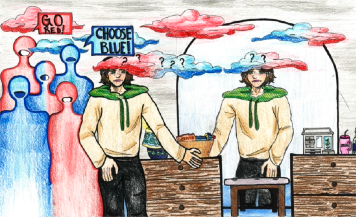Being accountable for mental health
While struggling with mental health issues, some may act out in negative ways, hurting themselves and those around them due to the symptoms of their condition. While mental health can sometimes explain why someone does problematic or harmful things to others, it does not excuse these actions.
Mental illnesses come with a wide variety of different symptoms and behaviors. Those with anxiety, for example, may find it hard to go out in crowded places or calm themselves down, while people with bipolar disorder experience mood swings and feelings of impulsivity. Symptoms of mental illnesses come with different levels of severity and affect people in various ways. Although mental health symptoms can impact your life, it is important to not use them as excuses for bad behavior.
In recent years, the stigmas surrounding the discussion of mental health have been broken down significantly. Many people find it easier than before to talk about mental health with others, including friends, parents and even teachers. Although it is important to talk about these issues with others to gain support and a sense of comfort, this broken-down stigma has also marked some negative changes in society.
According to an article by psychotherapist Nicholas Balaisis (RP, Ph.D.) from Psychology Today, an American media organization that focuses on psychology and human behavior, as mental health has become more widely talked about, so has the misuse of and dishonesty about mental illness symptoms.
“As awareness of mental health issues has grown, so too has the prevalence of people blaming their bad behavior on ‘poor mental health,’” Balaisis said. “Sometimes the use of mental health can cover up or shield an individual from taking responsibility for actions, behaviors or moods, or excuse them from the work that true mental health requires.”
Mental health symptoms can cause people to not fulfill certain responsibilities in their lives, but using these symptoms as an excuse and simultaneously not working toward trying to improve shows poor responsibility and ownership skills. There is a difference between taking a break to value your mental health and personal wellness and completely ignoring important responsibilities in your life – one shows growth and responsibility for yourself, while the other demonstrates a lack of accountability.
Many people fall into the trap of using their mental health as an excuse as their symptoms become more difficult to deal with. Sophomore Jessica Peterson suffers from depression and post-traumatic stress disorder (PTSD). While she is aware that the symptoms of her mental illnesses should not be used as excuses, she finds it difficult to maintain her usual life while dealing with personal issues that arise from them.
“I don’t handle my responsibilities well when I am struggling with mental health issues,” Peterson said. “I can’t focus at school, and I don’t feel like talking.”
When your psychological state becomes unmanageable, there are many different ways to work through these issues. All illnesses are different, and not all can be cured in quick or easy ways, but some steps can be taken to at least improve how you feel. Kaneland High School social worker Amanda Renn feels that communication is key to forming an understanding with others about how mental health affects you.
“[Mental health] should not be used as an excuse, but if you can communicate to others about what is going on and what your roadblocks are, there may be a way for someone to try to understand you and work with you [on your struggles],” Renn said.
It is also important to remember that just because you are dealing with difficulties in life, that doesn’t mean others aren’t going through their own problems as well. The people around us suffer from their own personal struggles on a daily basis, and assuming that you are the only one who has to cope with challenging circumstances is ignorant, although you may not even realize it. Blowing others off or ignoring their needs because of personal psychological struggles or a lack of awareness may cause relationships to weaken or fail.
Mental health diagnoses can cause several issues to arise, but using them as an excuse to justify poor behavior or a lack of care toward those close to you is harmful and shows an absence of responsibility for your actions.
“We can’t control how we feel,” Renn said. “We can control our actions.”

Name: Paige Whiteside
Position: Advisor's Assistant
Graduation year: 2024
A few sentences about me: I am taking...








